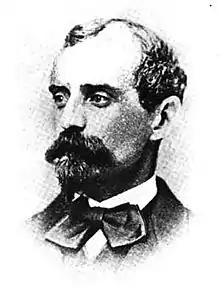Robert Williams (adjutant general)
Robert Williams (November 5, 1829–August 24, 1901) was an officer in the United States Army who served as Adjutant General of the U.S. Army from 1892 to 1893.
Robert Williams | |
|---|---|
 Robert Williams | |
| Born | November 5, 1829 Culpeper County, Virginia |
| Died | August 24, 1901 (aged 71) Netherwood, New Jersey |
| Place of Burial | |
| Allegiance | United States of America Union |
| Service/ | United States Army Union Army |
| Years of service | 1851–1893 |
| Rank | |
| Commands held | Adjutant General of the U.S. Army |
| Battles/wars | American Civil War Indian Wars |
Biography
He was born in Culpeper County, Virginia and graduated from the United States Military Academy in 1851. He was appointed to the 1st Dragoons, in which he served until the outbreak of the American Civil War. He served in various staff positions at the beginning of the war, before becoming colonel of 1st Massachusetts Volunteer Cavalry in October 1861. He resigned his Volunteer commission in October 1862 and became a major in the Adjutant General's Department.
Williams remained in the Adjutant General's Department following the end of the war, and was promoted to lieutenant colonel in February 1869. He was served as adjutant general of the Department of the Missouri, the Department of the Platte, and the Division of the Missouri, earning a promotion to colonel in July 1881. In December 1890 he returned to the Adjutant General's Department in Washington, and he was elevated to Adjutant General of the U. S. Army with the rank of brigadier general in July 1892. He retired in November 1893.
He died in August 1901, and is buried in Arlington National Cemetery.
References
- Association of Graduates (1902). Thirty-Third Annual Reunion of the Association of Graduates of the United States Military Academy. Saginaw, Michigan: Seemann & Peters. pp. 76–78.
External links
| Military offices | ||
|---|---|---|
| Preceded by John C. Kelton |
Adjutant General of the U. S. Army July 5, 1892-November 5, 1893 |
Succeeded by George D. Ruggles |